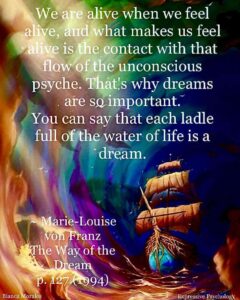![roof-dragon-providence-rhode-island-01[1]](http://jeanraffa.files.wordpress.com/2012/01/roof-dragon-providence-rhode-island-011.jpg?w=225) After my last post about the dragon dream, Rob asked if we dream out of both the personal and the collective (archetypal, therefore shared by everyone) unconscious, and if dreams about one’s personal unconscious sometimes use archetypal imagery. Yes. Many dreams seem to be purely personal, a few are purely archetypal, and most, like my dragon dream, are a combination of both. In fact, every dream symbol and theme actually has three possible levels of meaning: personal, cultural, and archetypal, so I always look for associations at all three levels. I’ll demonstrate with the symbol of a house.
After my last post about the dragon dream, Rob asked if we dream out of both the personal and the collective (archetypal, therefore shared by everyone) unconscious, and if dreams about one’s personal unconscious sometimes use archetypal imagery. Yes. Many dreams seem to be purely personal, a few are purely archetypal, and most, like my dragon dream, are a combination of both. In fact, every dream symbol and theme actually has three possible levels of meaning: personal, cultural, and archetypal, so I always look for associations at all three levels. I’ll demonstrate with the symbol of a house.
Personal Meaning of House: My dragon dream took place in the house in which my husband grew up. When Fred and I were dating I was invited often for meals, and after our marriage it was the setting for numerous family gatherings and fun celebrations. I have many warm associations with this house, all involving Fred and his funny, quirky family. Although my mother visited there a few times, I do not associate this house with her. I find this a curious aspect of the dream. The kitchen in Fred’s house was the core of family activity and most of our gatherings were centered around meals cooked by Fred’s beloved grandmother or stepmother (with whom he had a conflict-filled relationship). My mother never entertained and she cooked only the simplest of meals out of necessity, never passion or even interest, so her presence in this kitchen is an odd detail. The room in the far left corner of the house, streetside, was the bedroom shared by Fred’s brothers George and Tony. I adore them both and imagine them dreaming many beautiful dreams in there. In realilty, of course, the room had no garage door, although there were high windows. The actual garage was on the other end of the house, on the right side next to the kitchen. This was the garage I was heading for at the end of the dream.
![stock-photo-the-dragon-status-on-roof-of-joss-house-58274053[1]](http://jeanraffa.files.wordpress.com/2012/01/stock-photo-the-dragon-status-on-roof-of-joss-house-5827405311.jpg?w=300) Cultural Meaning of House: Houses everywhere represent protection from the elements, family, warmth, and comfort: nurturing qualities all. Kitchens are traditionally the purviews of grandmothers, mothers and other women who prepare food for their families. They are also rooms in which flour, milk, water, yeast, sugar and salt are mixed and baked in ovens, a magical process which transforms them into nourishing bread. Kitchens also have fresh water available for cooking and cleaning up.
Cultural Meaning of House: Houses everywhere represent protection from the elements, family, warmth, and comfort: nurturing qualities all. Kitchens are traditionally the purviews of grandmothers, mothers and other women who prepare food for their families. They are also rooms in which flour, milk, water, yeast, sugar and salt are mixed and baked in ovens, a magical process which transforms them into nourishing bread. Kitchens also have fresh water available for cooking and cleaning up.
Archetypal Meaning of House: Houses represent the psyche and everything that goes on in our minds. Archetypes are mental pictures of physical instincts. The needs of all five instincts (nurturance, activity, reflection, sex, and creativity) can be met in houses. This dream features three instincts. Nurturance is represented by the house, my mother, and the kitchen. The kitchen contains two especially vital symbols: a womb-like oven which transforms basic elements into the bread of life, and a source of water, the cleansing, life-giving element associated with humanity’s maternal Source, the Great Mother (she’s also associated with dragons). Activity is shown in the dragon’s banging on the roof and walls, and in my dream ego’s walking, then running away. Reflection is symbolized by the windows which provide an outlook into the unconscious, the dragon with its fiercely knowing, staring eye, and the keys representing access to secret knowledge and wisdom.
Do you see the wealth of multi-leveled meanings I can glean from these symbols? All but the dragon are parts of everyone’s personal life, yet most also appear in the myths and fairy tales of every culture. I’m still working on the dream. It could take a long time to understand, if ever. For now I’m just letting it cook.

A Lesson on Aging
I’m so happy to be back in the mountains. I love the weather, the trees, the birds, the rushing creek, the flowering bushes. The beauty.





0 Responses
Excellent, thanks for expounding more on this topic!
My pleasure, Rob. Thanks for inspiring this post! Jeanie
So excited for the release of your new book!
Thank you, Rob. Me too! I just talked to the publisher yesterday and it looks like everything’s on schedule. The New York Book Fair, where I’ll be doing a book-signing, will be held in early June this year, instead of late May, and I’m really looking forward to being there. Very exciting times for me! Best, Jeanie
As we speak of projection, dreams, and the interpretation of dreams, this question comes to mind: When you tell a dream, does the listener or reader perceive your dream or a projection of their own subconscious guided by the psychic anchors, which your dream presents for their subconscious response? In this context, if 200 people read the recounting of a dream, have there now been 200 dreams or only 1?
Hi Skip, Is this a Zen koan? Your answer depends on your definition of “dream.” But I can say that since every dream shared will be interpreted according to the perceptions of those who received it, including the dreamer herself, I suppose the answer would be 201 perceptions, if not 201 actual dreams. 🙂
Hi Jeanie, I had to smile at the mention of the koan. Here is a link to a 1-minute clip from “Finding Joe”, a new documentary about the life and work of Joseph Campbell, which seems to be on point http://vimeo.com/10572025 I bow to your (I believe) correct answer of 201!
Hi Skip, Thanks for the link. This looks to be a very promising film. His contribution to our understanding of the psyche is monumental. Jeanie
Hi, I’ve just stumbled across your blog , and although much of what you write is new to me, it got me thinking and wondering, is there any comparability between dreams and the creative process of our waking life? More specifically, when writing, poetry in my own case, and when the writing begins to feel it is taking its own course and not necessarily where I feel it should be going? Does this come from the same place where dreams are manufactured? Apologies for the off-theme comment, but as I say, you got me wondering. 🙂
Hi Brian,
This is not really off-theme at all, as I’m interested in anything that helps us gain a better understanding of our conscious and unconscious selves. Dreams and waking acts are both fed by the unconscious, both personal and collective. But the difference between a pure dream and a waking creative act would be that the dream is totally autonomous: it is an act of nature, something that happens to us that is totally beyond our ego’s control. All the ego can do is notice it and think about it and try to find meaning in it.
A waking creative act, however, whether it be writing, painting, dancing, composing, sculpting, or even making an original choice, is something the ego consciously chooses to do and has some control over. If our ego is open to the unconscious in whatever ways it expresses itself — dreams, intuitions, strong emotions, inner resonance, compulsions, passions, interests, accidents, some illnesses, synchronicities, etc. — our creative products will be, well, more creative and original (this would be when the poem, story or painting begins to take on a life of its own and the ego just watches and follows along) than those that are purely the product of a clever ego which uses logic and objective knowledge only.
So as my friend Skip (who manages the excellent website http://www.archetypeinaction.com ) said in a private conversation the other day, the most original, meaningful and important works of art always appeal to instinctual/archetypal truths which reside at the deepest levels of the collective unconscious. And I would add that the best way I know of to get in touch with that level (and thus with our creative genius) is to pay close attention to our dreams, because this establishes a connection between our ego and the archetypes so the creativity can keep flowing!
Thanks for the great question. It really got me thinking. And thanks for stopping by. I hope you’ll come back.
My best,
Jeanie